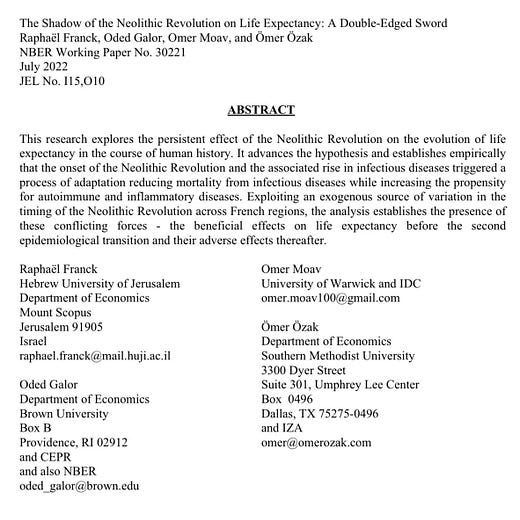Best of #econtwitter - Week of July 17, 2022 [1/3]
Jul 18, 2022
Welcome readers old and new to this week’s edition of Best of Econtwitter. Please submit suggestions — very much including your own work! — over email or on Twitter @just_economics.
This is part one of three.
Paper summaries

Jakob Schneebacher@j_schneebacher
Every economist, down to undergraduate students, learns of Baumol’s cost disease. But what if it is a simple measurement problem? This week I found myself re-reading a provocative paper by Alwyn Young from a few years ago. A brief 🧵. 1/
aeaweb.org/articles?id=10…
aeaweb.org
Structural Transformation, the Mismeasurement of Productivity Growth, and the Cost Disease of Services

1:20 PM · Jul 16, 2022
74 Reposts · 338 Likes

Jakob Schneebacher@j_schneebacher
Young’s argument is that the strong evidence on sectoral employment shares and productivity growth rates is not only consistent with Baumol’s mechanism (inherently lower productivity growth in services) but also with an entirely different explanation (worker self-selection). 10/

1:20 PM · Jul 16, 2022
1 Repost · 15 Likes

Ethan Mollick@emollick
Question about prehistory: did the Agricultural Revolution make our health better or worse?
This interesting paper argues it was great for the first 11,650 years or so, as our immune systems adapted to density & disease. But things changed dramatically starting around 1950… 1/2

3:24 AM · Jul 12, 2022
38 Reposts · 211 Likes
^note big differences in y-axes though!

Ethan Mollick@emollick
With the advent of public health & medicine, our ability to fight diseases became a liability, as autoimmune disorders became more of a risk than disease itself. The areas that had been first to have agriculture now have worse health than other areas. 2/2 nber.org/papers/w30221


3:24 AM · Jul 12, 2022
8 Reposts · 52 Likes

Gauti Eggertsson 🇺🇦@GautiEggertsson
For a good while now, I have been greatly annoyed by my tweed at the very beginning of the great inflation debate. The high inflation read yesterday reminded me of my mistake. The tweed minimized the role of the Biden stimulus in contributing to inflation. /1
4:35 PM · Jul 15, 2022
38 Reposts · 165 Likes

Gauti Eggertsson 🇺🇦@GautiEggertsson
In this extreme case, the world faces only a single “natural rate of interest” or what Fed people like to call “r-star.” Thus the EU and US common r-star is affected by fiscal policy in both regions. 11/
4:35 PM · Jul 15, 2022
1 Repost · 14 Likes

Joseba Martinez@josebammartinez
Do short-term tax cuts have long-term effects on GDP?
In a new paper (w Cloyne, Mumtaz and Surico) we find that short-term corporate tax cuts lead to higher productivity (and GDP) up to 10y after cut. Personal tax cuts have only short-term effects.
Link: tinyurl.com/2p843cmw

11:20 AM · Jul 12, 2022
57 Reposts · 214 Likes

Tarun Chitra@tarunchitra
Inspired by @stonecoldpat0's conference thread, I'm going to livetweet the crypto track at EC 2022

4:58 PM · Jul 12, 2022
12 Reposts · 79 Likes

Nick Bloom@I_Am_NickBloom
New paper showing large variations in wages for similar remote workers based on country of location
This explain what I hear some firms saying - that they are considering offshoring fully remote jobs to save on wage costs
bit.ly/3Iqa2Fo

2:18 PM · Jul 10, 2022
52 Reposts · 161 Likes

Carly Urban@carly_urban
From 2007-2017, 5 states began requiring at least one semester of personal finance prior to HS graduation. This has risen to 15 in the last few weeks!!!
In new research, I ask: does the new requirement come at a cost by reducing high school graduation?
8:06 PM · Jul 11, 2022
16 Reposts · 101 Likes

Alexander Berger@albrgr
Interesting paper finding that air pollution reduces performance in chess, particularly under time pressure: dropbox.com/s/kagethk90m8a…


10:10 PM · Jul 13, 2022
31 Reposts · 145 Likes
Public goods

Heidi L. Williams@heidilwilliams_
@Afinetheorem @bfjo @open_phil @nberpubs @mattsclancy Second is a set of lecture notes that you can build on yourself, or use as is

5:53 PM · Jul 15, 2022
14 Reposts · 54 Likes

Dr Arthur Turrell@arthurturrell
One for economic historians here: automatic, unsupervised extraction of road networks from historical maps. H/T @puntofisso
#econtwitter #datascience
github.com
GitHub - johannesuhl/hironex: HiRoNEx: Historical road network extractor: A python tool for automatic, fully unsupervised extraction of historical road networks from historical maps.

12:49 PM · Jul 14, 2022
60 Reposts · 223 Likes

David Schönholzer@davidfromterra
In this year's edition of diff-in-diff in our Econometrics PhD class, I added a new lecture on matched DID and synthetic controls. All updated panel/DID lectures are on my website at the end of this new thread.
Here are some updated examples on the power of matrix visualization.

David Schönholzer @davidfromterra
Hey #EconTwitter! Thinking about including modern diff-in-diff in a 1st year econ metrics class? Here are some ideas from a class co-taught with @kbburchardi and @arash_nekoei. Key elements:
1) MATRIX VISUALIZATION
2) UNIFIED NOTATION
🧵⬇️
Most of what I covered in one slide: https://t.co/goeNeKfPRV
5:16 PM · Jul 15, 2022
145 Reposts · 886 Likes

YouTubeInsider@YouTubeInsider
Today, @YouTube is expanding access to our global Data API for academic researchers. This is a first step for the YouTube Researcher Program and we’ll continue to build it out over time. Learn more:
research.youtube
YouTube Research - Home

5:23 PM · Jul 12, 2022
101 Reposts · 255 Likes

